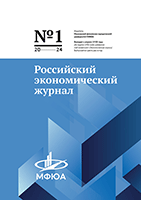Архив
Российский экономический журнал 6 / 2015
Abstracts of Main Articles
Designed budget policy 2016: the imperative of socio-economic course «reversion» was, as expected, ignored again (estimates and suggestions by left-wing deputy corps representatives: G. Zyuganov, O. Dmitrieva, I. Grachiov, N. Petukhova, A. Krutov). Introduction and afterword by A. Melentiev
Abstract
The publication, opened and closed with lengthy comments by the journal chief editor, reproduces reasonably critical speeches of the «parliamentary (Duma) left-wingers» – CPRF leader Dr. phil. G.A. Zyuganov and a group of deputies headed by State Duma Budget and Taxes Committee deputy chairman, Sc.D. (Economics), prof. O.G. Dmitrieva – in the course of discussion on «2016 Federal Budget» draft federal law. The general conclusion by the authors of the reproduced texts and the journal staff serves as the publication headline
Key words:
2016 Federal Budget, draft federal law, budget policy, socio-economic course, macroeconomic forecast, budget revenue, budget spending, budget deficit (surplus), fiscal space, alternative budget, sequester, safety net
PROSPECTS AND RISKS OF DEVELOPMENT OF THE NORTHERN SEA ROUTE AS A RUSSIAN THROUGH-PASSAGE OF GLOBAL INTEREST
Author
Yeliseev D.O., PhD (Economics), Institute of Market Problems, RAS
Abstract
The article carries the author’s ideas concerning Russia’s most rational, optimal response to Northern Sea Route related geo-economic and geo-political problem, which emerged in postsoviet decades. The author believes that such response must account for not only new opportunities and benefits of the relevant international cooperation but also for the arising serious risks.
Key words:
Northern Sea Route, Arctic Ocean, polar zone of Russia, new development (redevelopment) of Russia’s Arctic region, Eurasian transport corridors, northern supply haul, global climate change consequences for Arctic Regions
PROJECT APPROACH AS A MULTILEVEL MANAGEMENT PHENOMENON: GENERAL SYSTEM CONTENT, CURRENCY OF APPLICATION AT MACROLEVEL, NECESSITY AND SPECIFICS OF USE BY BIG INTEGRATED CORPORATIONS
Author
Vinslav Yu.B., ScD (Economics), Professor
Abstract
Assuming that the «project approach» as a phenomenon of management theory and its practical interpretations is far from new in itself, the author of the annotated lengthy paper (first part saw print in No.5 for 2015) stands, however, for a certain rethinking of this phenomenon, primarily in terms of its interpretation as a mobilization tool used in big business (up to national economic) systems. Proceeding from this methodological attitude, the first section of the article briefly describes the general system-wide contents of the project approach (organically associated with the contents of program approach), shows universality of its potential in terms of opportunities for its application at different levels of economy management, including national and corporate, as well as stresses the respective necessity augmented at the current crisis stage of Russia’s national economy evolution. The second section of the article reviews, in relative detail and from different angles, the specific use of the considered approach by large integrated corporations
Key words:
project approach (in management), project methodology, program approach, project and program approach, mobilization approach, management at macrolevel, management at microlevel, corporate management, corporate strategies, technological (innovation) projects, investment projects, organizational projects.
RUSSIA’S ARCTIC ZONE INNOVATIVE DEVELOPMENT PROJECTS IN TERMS OF «GREEN GROWTH» THEORY
Author
Borisov V.N., ScD (Economics), Professor, head, National Economy Structure Dynamics Lab., Institute of National Economic Forecasting, RAS; O. Pochukaeva, ScD (Economics), leading research associate of same laboratory.
Abstract
The article authors interpret the promotion of technical and economic projects, related to development of RF arctic zone as an integral component of its «novel development (redevelopment)», also as an acid test of economy «green growth» theory principles, such as imperatives of radical resource saving and environmental friendliness. Proceeding from this («tinted green») attitude, the article identifies development priorities of engineering industry for Arctic Russia, states proposals for justification of the respective (primarily those featuring in programs) regional innovation projects (phases and effects thereof), as well as analyses the specific useful and humbling experience in establishment of arctic-oriented innovative engineering, with case study on Omsk-based engineering cluster and «Innovative transport vehicles for remote Far North, Siberia and Far East regions» project
Key words:
arctic zone of Russia, novel development (redevelopment) of Russia’s polar regions, innovation projects, economy green growth theory, innovation programs, resource saving, Omsk-based engineering cluster, Innovative transport vehicles for remote Far North, Siberia and Far East regions project

